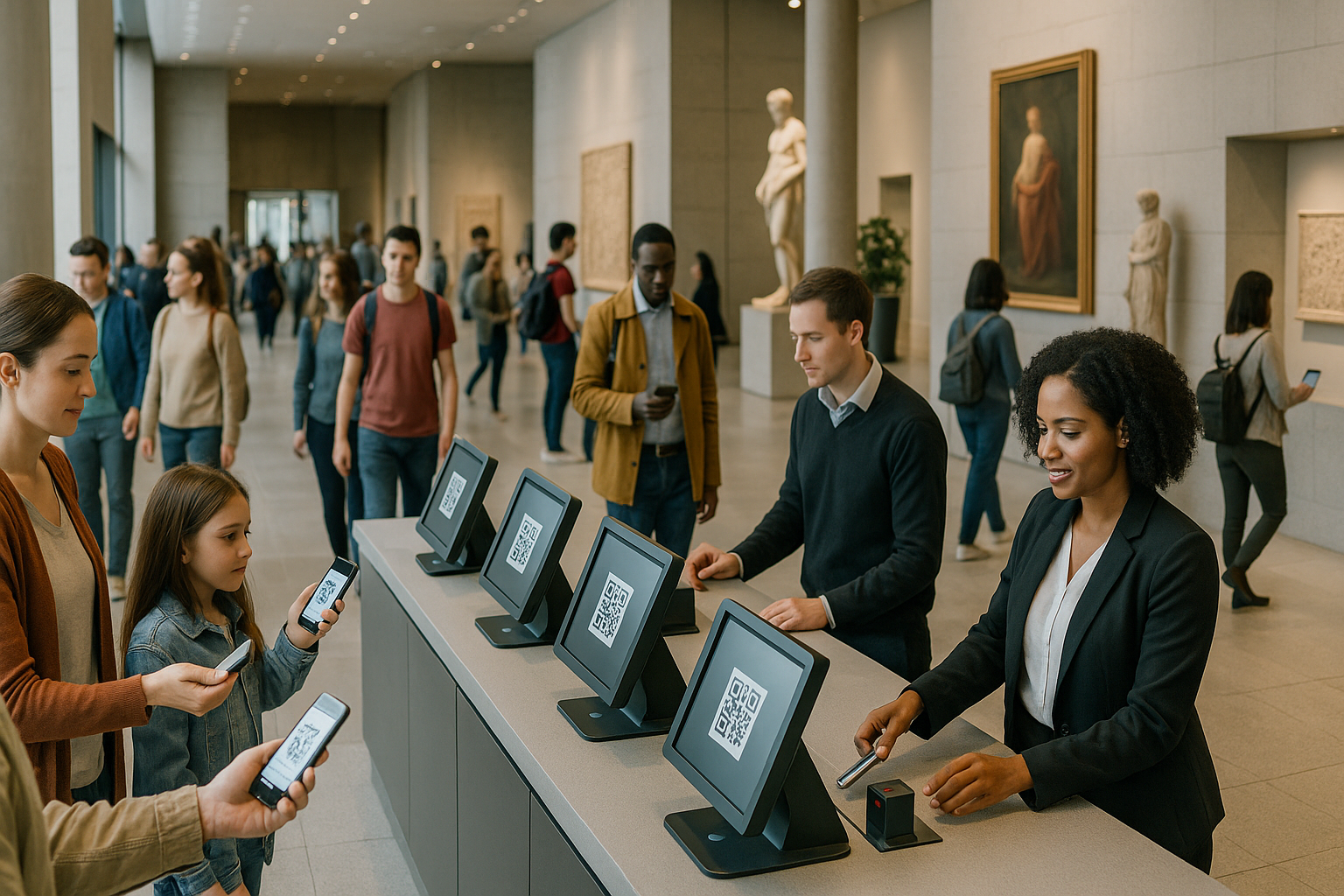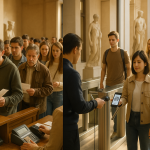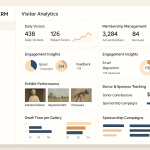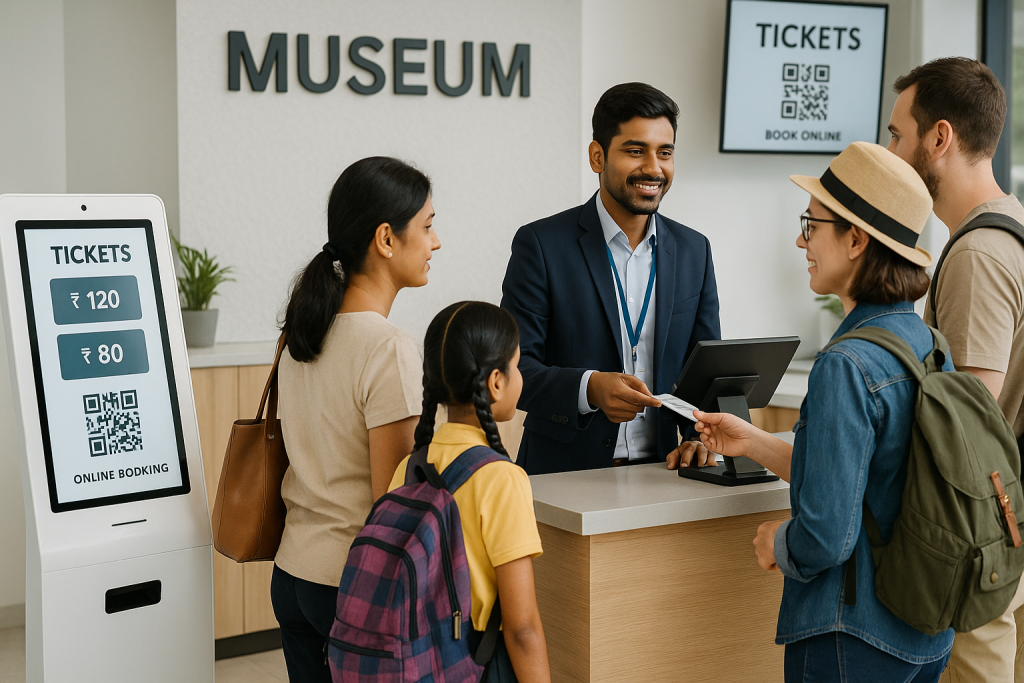Event ticketing software is transforming the way audiences engage with cultural institutions, and 2025 marks a turning point in how museums plan, host, and manage events. From art exhibitions and historical showcases to fundraising galas and educational festivals, visitors now expect seamless, digital-first experiences when booking their tickets. For museum directors, this means one thing: choosing the right event ticketing software has become a critical part of running successful operations.
In the past, ticketing was limited to simple entry management. Today, event ticketing systems act as full-fledged digital platforms that manage online reservations, real-time visitor tracking, mobile check-ins, and even marketing automation. With the rise of hybrid and experiential events, the demand for advanced ticketing solutions is higher than ever.
This blog explores the best ticketing systems 2025, tailored specifically for museums. Whether you’re upgrading from legacy tools or looking for cloud-based ticketing systems that support large-scale cultural events, this guide will help you understand the features, benefits, and future trends of digital ticketing platforms.
Why Event Ticketing Software Matters for Museums in 2025
For museums, ticketing is no longer just about granting entry—it’s about shaping the entire visitor journey. In 2025, cultural institutions are competing not only with other museums but also with concerts, festivals, and immersive experiences. To stay relevant, they need event ticketing software that delivers speed, convenience, and flexibility.
Visitors expect the same smooth booking process they experience with airlines, streaming platforms, or concert venues. That means museums can’t rely on outdated manual systems or fragmented tools. Instead, they need online event ticketing platforms that allow guests to reserve spots from their phones, receive instant confirmations, and skip queues with digital passes.
For museum directors, adopting modern event ticketing systems is more than a technology upgrade—it’s a strategy to increase attendance, grow memberships, and unlock new revenue opportunities. From conference ticketing software for educational events to festival ticketing solutions for cultural fairs, these systems give museums the agility to manage diverse programs on a single platform.
In short, ticketing software for events has become the foundation of audience engagement. Without it, museums risk falling behind in both visitor satisfaction and operational efficiency.
Key Features to Look for in Modern Event Ticketing Systems
Not all event ticketing systems are created equal, and for museum directors, the right choice depends on how well the platform aligns with visitor expectations and organizational goals. In 2025, the best solutions go beyond basic ticket sales and provide tools that enhance both front-end visitor experience and back-end operations. Here are the must-have features to prioritize when evaluating ticketing software solutions:
- Online & Mobile BookingVisitors should be able to purchase tickets anytime, anywhere. Platforms offering best online ticketing services ensure smooth reservations across devices, including mobile-friendly passes for faster entry.
- Cloud-Based ScalabilityWith rising attendance at cultural festivals, exhibitions, and events, cloud-based ticketing systems allow museums to scale effortlessly without downtime or complex upgrades.
- Customizable Ticketing SoftwareMuseums often run multiple programs—from exhibitions to donor events. A platform with customizable ticketing software lets you create unique ticket types, membership bundles, and add-ons like donations or guided tours.
- Advanced Ticketing SolutionsModern digital ticketing platforms should include QR-based access, real-time analytics, and integration with CRM tools for personalized promotions and loyalty campaigns.
- Security & ComplianceWith increasing online transactions, event ticketing software must support secure payments, GDPR compliance, and fraud prevention to protect both the institution and its visitors.
By prioritizing these features, museum leaders ensure they’re investing in ticketing software for events that is future-proof, visitor-friendly, and aligned with the needs of 2025.
Best Event Ticketing Software Systems 2025
With so many platforms available, selecting the right event ticketing software can feel overwhelming. To make the decision easier for museum directors, here’s a curated list of the top ticketing software 2025 solutions—evaluated through the lens of museum needs such as visitor engagement, scalability, and integration.
1. EveryTicket
Designed specifically for cultural institutions, EveryTicket is a digital ticketing platform built to streamline museum admissions and event management. It integrates with CRM systems, supports group bookings, and provides real-time visitor analytics. For directors seeking a system tailored to exhibitions, festivals, and donor programs, EveryTicket offers unmatched flexibility.
2. Eventbrite
A leader in online event ticketing, Eventbrite is known for its ease of use and wide adoption. While not museum-specific, it works well for small to mid-sized institutions hosting community events or workshops. Its strength lies in its user-friendly booking experience and integration with marketing tools.
3. Ticketmaster
Globally recognized as a concert ticketing software giant, Ticketmaster is ideal for large-scale museum events such as concerts, cultural festivals, or high-profile exhibitions. Its advanced ticketing features include fraud prevention and mobile-first ticket delivery, though it may be overbuilt for smaller museums.
4. Eventbee
For cost-conscious institutions, Eventbee provides affordable ticket sales software with flat-fee pricing. While lighter in features, it’s a practical choice for museums running smaller cultural programs or seasonal events that don’t require full enterprise-level systems.
While many platforms offer useful features, EveryTicket stands out as the best ticketing software for Indian museums. Designed with the unique challenges of Indian cultural institutions in mind, such as high visitor volumes, diverse audiences, and the need for simplified reporting. EveryTicket helps directors align operations with their goals. The result is smoother bookings, faster entry, and a more engaging visitor experience tailored to Indian museums.
How Museums Can Choose the Right Event Ticketing System
Not all event ticketing systems are built alike and museums have unique needs compared to concert venues or conference organizers. When selecting a platform, directors should evaluate solutions beyond just ticket sales. The right choice should enhance both operations and visitor experience.
1. Define Your Museum’s Event Goals
Start by clarifying what your institution wants to achieve. Are you focused on driving higher attendance, improving donor engagement, managing memberships, or creating smoother entry lines? The best digital ticketing platforms are those that directly align with your museum’s long-term goals.
2. Prioritize Integration
Museums often juggle multiple systems—CRM, POS, donor management, or exhibition planning tools. Look for ticketing software solutions that integrate seamlessly with these existing systems to avoid data silos and manual work.
3. Assess Visitor Experience Features
The visitor journey should be simple: easy online booking, flexible payment options, mobile entry, and fast check-ins. Museums benefit most from online event ticketing platforms that minimize wait times and maximize satisfaction.
4. Ensure Scalability
As museums grow or launch new exhibitions, the ticketing platform should scale easily. Whether you’re hosting small workshops or blockbuster traveling exhibitions, the system should handle spikes in demand without downtime.
5. Evaluate Analytics and Reporting
Modern ticket sales software goes beyond selling tickets—it provides insights. Look for solutions with real-time dashboards that track attendance trends, peak booking times, visitor demographics, and revenue reports to inform smarter decisions.
6. Consider Pricing Models
From per-ticket fees to flat subscription pricing, models vary widely. For museums, balancing cost-effectiveness with features is key. Platforms like EveryTicket, for instance, offer predictable costs that fit nonprofit budgets.
By taking these factors into account, museums can confidently select the best ticketing software system for their audiences and operations, ensuring both financial sustainability and memorable visitor experiences.
What’s Your Way Forward!
Manual booking systems limit growth, create inefficiencies, and frustrate visitors. On the other hand, adopting a modern event ticketing system for museums transforms the entire experience, making entry faster, operations smoother, and data insights sharper.
Museums that embrace digital ticketing solutions not only improve visitor satisfaction but also unlock new revenue streams through memberships, donations, and curated events. With the right platform, museums can compete with modern entertainment options while preserving cultural heritage.
If your museum is still relying on outdated booking methods, now is the time to shift. A smart event ticketing software system can help you reduce operational challenges, improve efficiency, and ensure a delightful visitor journey from start to finish.
Ready to modernize your museum’s ticketing?
Fill the Inquiry form to book a free demo with EveryTicket today and experience how effortless museum ticketing can be.
FAQs
1. What is an event ticketing system for museums?
An event ticketing system is software that helps museums sell tickets online, manage bookings, track attendance, and streamline visitor entry. Unlike manual methods, it provides digital convenience for both organizers and visitors.
2. How does an online ticketing platform improve visitor experience?
With an online event ticketing platform, visitors can purchase tickets in advance, choose time slots, avoid long queues, and receive instant confirmations. This leads to smoother check-ins and a better overall museum experience.
3. Can ticketing software integrate with museum membership systems?
Yes. Many ticketing software solutions integrate with membership management tools, donor CRMs, and payment gateways. This allows museums to track member benefits, discounts, and renewals directly through the same platform.
4. Is digital ticketing affordable for smaller museums?
Absolutely. There are scalable options ranging from low-cost ticket sales software with per-ticket pricing to more advanced subscription-based platforms. Smaller museums can start with lightweight solutions and upgrade as visitor numbers grow.
5. How do event ticketing systems help museums increase revenue?
Beyond selling tickets, modern platforms include dynamic pricing, upselling, and data-driven promotions. These features help museums attract more visitors, encourage repeat visits, and boost revenue through memberships and merchandise.
6. Which is the best ticketing software system for museums?
The “best” depends on museum needs. For example:
- Small museums may prefer affordable cloud-based tools.
- Larger institutions benefit from comprehensive event ticketing systems with integrations, analytics, and multi-location support.
EveryTicket is one solution designed specifically to simplify museum ticketing and enhance both visitor experience and organizational efficiency.



